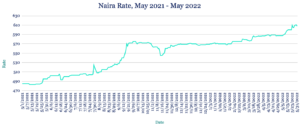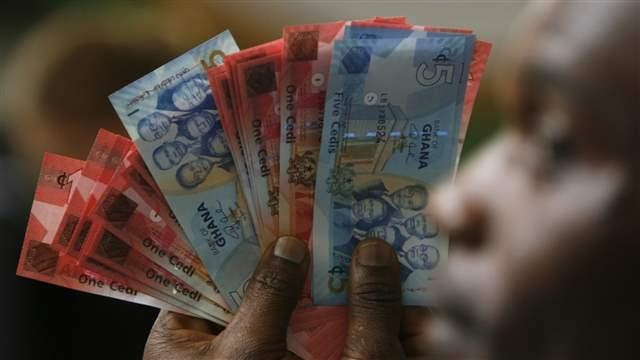EU eyes African aid package amid food supply issues
EU sanctions on Russian banks are exacerbating Africa’s growing food crisis by making it difficult to pay for wheat exports, according to African Union chair and Senegal President Macky Sall. He told EU leaders that the worst is still ahead if global food supply issues persist.
The food crisis has also prompted EU leaders to consider sending Africa an aid package worth $535m to help tackle food shortages that officials worry could spur a fresh wave of migration into Europe.
With supply chain issues pushing inflation higher across the continent, we expect continued pressure on African FX markets in the near term.
Under-pressure Naira edges back from fresh dollar low
The Naira pulled back from a record low against the dollar, trading at 608 having clipped 611 earlier in the week from 610 at Friday’s close.
 Flight delays and cancellations continue to hamper Nigerian travellers despite an alliance signed by six major airlines in the country to navigate the aviation fuel crisis. The consortium said the cost of aviation fuel has eroded any gains made from the alliance.
Flight delays and cancellations continue to hamper Nigerian travellers despite an alliance signed by six major airlines in the country to navigate the aviation fuel crisis. The consortium said the cost of aviation fuel has eroded any gains made from the alliance.
Meantime, Nigeria’s main opposition party PDP has selected former Vice President Atiku Abubakar as its primary candidate for next year’s presidential election. We expect the Naira to appreciate in the run up to the election as political dollars in circulation are converted back to the local currency.
Cedi to stabilise as rate hikes take effect
The Cedi weakened marginally against the dollar this week, trading at 7.80 having opened the week at 7.77.
 While the currency’s rapid depreciation has slowed over the past couple of weeks, the currency has still lost more than a quarter of its value since the start of the year.
While the currency’s rapid depreciation has slowed over the past couple of weeks, the currency has still lost more than a quarter of its value since the start of the year.
Total public debt currently stands at about 78% of GDP, with Ghana shut out of global capital markets after credit ratings agencies Fitch Ratings and Moody’s Investors Service both cut the country’s sovereign debt rating earlier this year.
We expect the Cedi to hold steady in the coming days on the back of Ghana’s recent interest rate hikes.
Rand strengthens as unemployment edges lower
The Rand appreciated marginally against the dollar this week, trading at 15.51 from 15.62 at last Friday’s close, supported by local and global factors.
 On the domestic front, unemployment fell to 34.5%—down from a record 35.30% in the fourth quarter of 2021. From an international standpoint, the risk-on rally boosted the Rand, with the US Dollar index easing off its recent highs.
On the domestic front, unemployment fell to 34.5%—down from a record 35.30% in the fourth quarter of 2021. From an international standpoint, the risk-on rally boosted the Rand, with the US Dollar index easing off its recent highs.
A number of analysts believe this optimism could be short-lived, suggesting the Rand could be heading back to the 16 level.
However, we expect the Rand to remain around the 15.5 level, at least in the near term, with any shift in the dollar’s outlook likely to be the main driver for any further strengthening or weakening.
FX outflows take toll on Egyptian Pound
The Pound weakened marginally against the dollar this week, trading at 18.6 from 18.58 at last week’s close, extending a dismal run for the currency as FX outflows continue to weigh heavily.
 Egypt this week signed an agreement with the UAE and Jordan to double its exports to $100bn over the next three years, part of a broader plan to bolster trade with Middle Eastern countries to limit the impact of Russia’s war in Ukraine.
Egypt this week signed an agreement with the UAE and Jordan to double its exports to $100bn over the next three years, part of a broader plan to bolster trade with Middle Eastern countries to limit the impact of Russia’s war in Ukraine.
We expect the Pound to remain under pressure over the coming week, though we don’t anticipate any major slippage from around the current 18.6 level.
Parallel FX market emerges in Kenya as Shilling hits new low
The Shilling hit a fresh record low again this week, trading at 117.01 from 116.39 at last week’s close amid heavy dollar demand from the energy sector combined with month-end demand from food importers.
 The Kenya Association of Manufacturers has warned that a parallel FX market has emerged as a result of the dollar shortage. It said that banks are placing caps on amounts they are willing to sell at nearly 3% above the official market rate.
The Kenya Association of Manufacturers has warned that a parallel FX market has emerged as a result of the dollar shortage. It said that banks are placing caps on amounts they are willing to sell at nearly 3% above the official market rate.
Central Bank Governor Patrick Ngugi Njoroge denied there is an FX shortage, blaming the strains on dividend repatriation season and the spike in global energy and food prices. We expect the Shilling to lose further ground in the coming days.
Ugandan Shilling declines as inflation hits five-year high
The Shilling depreciated against the dollar this week, trading at 3795 from 3703 at last week’s close.
 The latest bout of weakness came as Ugandan annual inflation increased at the fastest pace in five years, with prices up 6.3% in May compared to 4.9% in April.
The latest bout of weakness came as Ugandan annual inflation increased at the fastest pace in five years, with prices up 6.3% in May compared to 4.9% in April.
Food and drink prices rose 11%, including cassava, which President Yoweri Museveni had last month called on Ugandans to substitute for bread amid higher global wheat prices caused by Russia’s war in Ukraine.
Despite the current weaker tone, we expect to see the Shilling start to strengthen by the end of this month due to the acceleration of the Uganda private sector and the interest rate at 6.5%.
Tanzanian Shilling to stabilise amid fuel subsidy, remittance uptick
The Shilling weakened marginally against the dollar this week, slipping to 2329 from 2325 at last week’s close.
 That slight decline came even as Tanzania’s fuel subsidy kicked in and as the government revealed the value of diaspora remittances increased 42% in 2021 compared to a year earlier, with overseas Tanzanian nationals sending home $569.5m.
That slight decline came even as Tanzania’s fuel subsidy kicked in and as the government revealed the value of diaspora remittances increased 42% in 2021 compared to a year earlier, with overseas Tanzanian nationals sending home $569.5m.
Also this week, Tanzania opened a new consulate in the Chinese city of Guangzhou in a bid to boost trade ties between the two countries. We expect the Shilling to steady near term.
Note to journalists: please feel free to quote from this briefing for news reports and let us know any requests for further comment or interviews via the contact details at the end, or by reply to this email. AZA is Africa’s largest non-bank currency broker by trading volume at over $1 billion annually. See https://www.azafinance.com
Issued by AZA. This Newsletter is produced as a service to our clients. It is prepared by our dealing professionals and is based on their understanding and interpretation of market events. AZA cannot be held responsible for any losses of whatever nature sustained as a result of action taken based on comments contained in this publication.
For more information, high-resolution charts or interviews, please contact:
Gavin Serkin
[email protected]
+44 20 3478 9710










